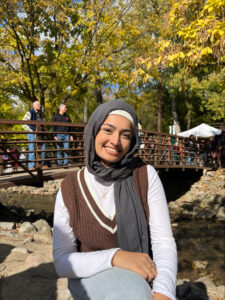“Where Are All the Women? Untold Experiences from the Holocaust”
“Where Are All the Women? Untold Experiences from the Holocaust” Read More »
“Where Are All the Women? Untold Experiences from the Holocaust” Read More »

What attracted you to the WGS minor?
As a woman, I am aware of my own experiences and difficulties that I face because of it. However, I was interested to learn about how gender plays a role in our society on a systemic level; furthermore, reflecting on how it intersects with my identity as a Muslim Indian-American. My WGS minor classes allowed me to explore this and learn more about the impact of women and gender on our society.
What has been most interesting about your experience with the Program so far?
The most interesting experience I’ve had in the WGS Program is hearing the various ways people view gender and how these issues impact everyone differently. My favorite part of the program is getting the chance to hear these other perspectives, whether it be in my own classes or through WGS events such as the writing competition. Hearing other’s personal experiences with gender has opened my eyes to things I never thought about before.
Have you found any aspect of your WGS studies surprising?
An aspect of my WGS studies that was surprising was how many different areas I was able to explore gender through. The WGS minor offers classes from many departments which has allowed me to learn about how gender has influenced literature, psychology, and religion. I was able to think of these subjects in a new light and furthered my understanding of gender studies.
Has your work as a WGS minor impacted your other course work?
My work as a WGS minor has definitely impacted my other course work. Gender has influenced everything in our society even if we aren’t aware. For example, as a psychology major, I learn about a great deal of theories regarding human behavior. My WGS minor has impacted my psychology studies as I now analyze whether gender, sexuality, etc. has influenced these theories and studies. It was interesting to find out how any topic can be looked at within the lens of gender.
Have you seen any intersections between your work as a WGS minor and your experiences outside the classroom?
I have seen how my work as a WGS minor has intersected with my work in various student organizations. One example is through my presidency of Not My Fault, a sexual violence awareness group on campus. As a WGS minor, I have been able to learn about gender-based violence and have used that information to address this issue through advocacy and awareness. WGS has allowed me to expand my knowledge and use it to make an impact in the world.
Interview with Aasiyah Khan, graduating in May 2023 Read More »
Hsiao-Lan Hu (pronouns: ze/hir/hir), Director of the WGS Program and Professor of Religious Studies, led a committee of international scholars to evaluate and organize the program for the 18th Sakyadhita International Conference on Buddhist Women, to be held in Seoul, Korea in June 2023. Upon the request of a board director of the Parliament of the World’s Religions, ze is organizing a panel on “The Global Ethic and the Challenging Path to Full Ordination for Buddhist Women” for the 9th meeting of The Parliament of the World’s Religions, to be held in Chicago in August 2023, and is invited to be a panelist on “Multi-Religious Perspectives on the Parliament’s Global Ethic” at the same meeting. Dr. Hu was a roundtable panelist on “Transcending and Transforming Catastrophes: Women of Color and Strategies for Survival” at the American Academy of Religion 2022 Annual Meetings, and will present on the roundtable panel on “Indigenous Feminism between India and China” at the 2023 Annual Meetings. On campus, ze served as a panelist on “Faith, Hope, and Love: Faith Through the LGBTQ+ Lens—An Interfaith Panel Discussion of Faith and Identity.”
Allegra Pitera, Professor of Architecture and Community Development, will collaborate with retired WGS faculty Professor Libby Blume to research under-represented architects and designers, mostly focusing on women.
Gail Presbey, Professor of Philosophy, published “Gandhi’s Encounter with the British Suffrage Movement: Lessons Learned,” in Gandhi’s Global Legacy: Moral Methods and Modern Challenges, ed. Veena Howard (Lanham, MD: Lexington Books, 2023), 87-106, and “Wisdom from Women in Africa” and two of the appendices in Rethinking African Sage Philosophy: Interdisciplinary Perspectives on and Beyond H. Odera Oruka, eds. Kai Kresse and Oriare Nyarwath (Lanham, MD: Lexington Books, 2023), 99-122. She also published a blogpost “The Work of Brave Women at the El Paso-Juarez Border” on the Sisters of Mercy website on June 23, 2022. Her journal article “How Nonviolent Movements in the Caribbean Influenced Pan-Africanism” will be published in Peace & Change: A Journal of Peace Research, 48/2 (2023). Professor Presbey presented a paper, “Catholics Supporting the Cuban Revolution: Dorothy Day in 1962, Betty Campbell and Peter Hinde in 1989” at a conference on “Construction of socialism in theory and practice” at Havana University Institute of Philosophy and Martin Luther King Center in Cuba in June 2022. She also organized the Bioneers conference hosted by Detroit Mercy in October 2022.
Faculty Accomplishments and Current Projects 2022-2023 Read More »